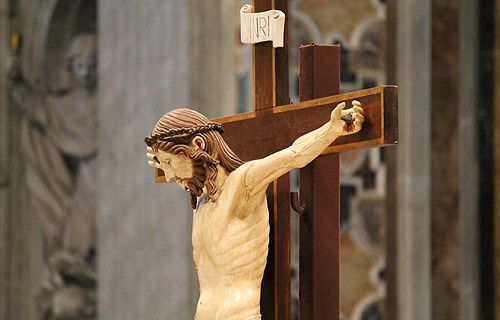In his daily homily Pope Francis focused on how Jesus heals our sin with the Cross, and emphasizing that Christianity is not merely following a written formula, but rather a person who sacrificed for us. “Christianity is not a philosophical doctrine, it’s not a program for life survival or education, or for peacemaking. These are consequences. Christianity is a person, a person raised on the Cross,” the Pope expressed in his April 8 daily Mass. Speaking to those gathered in the Vatican’s Saint Martha guesthouse, the pontiff highlighted how Christianity does not exist without the Cross, because we are not able to free ourselves from sin on our own. Reflecting on Jesus’ warning to the Pharisees in the Gospel reading, taken from John, when he tells them that “You will die in your sin,” the Pope emphasized that “It is impossible for us to free ourselves from sin on our own. It’s impossible.” “These doctors of the law, these people who taught the law, didn’t have a clear idea on this,” he noted, observing that “they believed, yes, in the forgiveness of God but considered themselves strong, self-sufficient and that they knew everything.” In the end “they transformed religion, their adoration of God, into a culture with values, reflections, certain commandments of conduct to be polite” he continued, adding that although they did believe the Lord could pardon them, “they were far removed from all this.” Explaining how the serpent is the symbol of sin in the Bible, the Roman Pontiff drew attention to how sin was lifted up in the desert during the day’s first reading from Numbers, when God offered to heal his people with a staff in the form of a serpent from the bites of the snakes he sent to afflict them due to their complaints. This sin was raised, the Pope observed, because it sought salvation and healing, and asked the Lord to be delivered. Highlighting how Christianity is not merely a “philosophical doctrine” or a “program for life survival,” Pope Francis pointed out that “Christianity is a person,” and is one “who annihilated himself to save us, who became sin.” “Just as sin was raised up in the desert, here God who was made man and made sin for us was raised up. All our sins were there,” he went on to say. “You cannot understand Christianity without understanding this profound humiliation of the Son of God who humbled himself and became a servant unto death, even death on a cross, in order to serve us.” It is for this reason Saint Paul exclaims that we have nothing to boast about other than our sins, the Pope continued, noting that this is our misery, but that through the mercy of God we are able to rejoice in the Crucified Lord. “The Cross is not an ornament that we must always put in the churches, there on the altar. It is not a symbol that distinguishes us from others,” he stated, clarifying that “the Cross is mystery, the mystery of God who humbles himself, he becomes ‘nothing.’ He becomes sin.” “Where is your sin?” he asked, noting how many might say “‘I don’t know, I have so many here.’” “No, your sin is there, in the Cross. Go and find it there, in the wounds of the Lord and your sins will be healed, your wounds will be healed, your sins will be forgiven.” Concluding his reflections, Pope Francis emphasized that forgiveness which God gives us “is not the same as canceling a debt that we have with Him,” but rather “the forgiveness that God gives us are the wounds of his Son on the Cross, raised up on the Cross.” “May he draw us toward Him and may we allow ourselves to be healed by him,” he prayed.

